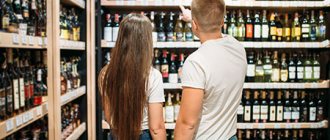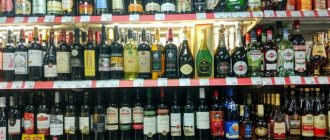Home>Articles> 18 or 21 – at what age do they sell alcohol in Russia?
quick menu (hide)
- Purchasing alcohol under 18 years of age
- Consequences of breaking the law
- Sales rules
- From what age do they sell alcohol?
- Sale by bottling
- Sale restrictions
- Selling alcohol via the Internet
- Regional restrictions
- Harm of alcohol for children
In our country, young people are allowed to buy alcohol after they reach adulthood. Officially, young people who celebrated their 18th birthday were recognized as adults. But in some areas , local authorities have decided that alcohol can only be sold to young people aged 21.
In some countries of the world, the answer to the question: from what age do they sell alcohol? - it sounds like this - “since sixteen”. These countries include:
- Italy,
- Morocco,
- Austria, etc.
Purchasing alcohol under 18 years of age
In response to the question: how old has alcohol been sold in Russia? - the State Committee on Civil Welfare Law s21 p1 was developed, which states that in Russia adulthood is celebrated at 18 years of age. According to Federal Law No. 171, the sale of alcoholic beverages to minors is illegal.
The exception is for persons emancipated by court. That is, they receive adult rights before reaching 18 years of age.
The procedure for recognizing a teenager as an adult – “legal definition” – is carried out in accordance with the law (Article 27 of the Civil Code of the Russian Federation). It is carried out only:
- when a teenager gets a job, as a result of which an employment contract must be drawn up or a contract signed with him,
- upon marriage (Article 21.p.2 of the Civil Code of the Russian Federation),
- if a teenager carries out entrepreneurial activities with the consent and receipt of permission from parents, adoptive parents or guarantors.
Consequences for breaking the law
Not all young people agree to calmly wait until they come of age. They try to resort to various tricks to buy alcohol. Therefore, in 1995, a law was developed (Federal Law No. 171) providing for punishment for the sale of alcoholic beverages to children.
The fine for selling alcohol to minors is paid:
- cashier or salesperson
- owner of the shopping pavilion,
- the fine is imposed on a legal entity, which means a store.
Parents of teenagers who were caught drinking alcohol are subject to punishment. The fine is 1.5 – 2 thousand rubles. the amount of the fine is specified in the Code of Administrative Offences, Article 20.22. The Code (Article 6.10) provides for punishment for persons who involve teenagers or children in drinking alcohol. The punishment can reach 5 thousand rubles.
But despite everything, the severity of the punishment is not enough. Therefore, measures to tighten penalties are now being considered. Legislators also plan to raise the age at which young people can drink alcohol. It is planned to raise the age to 21 years.
In addition to the legislative ban on the sale of alcohol to children in Russia, the leadership of some regions and autonomies may introduce their own bans on the sale of alcoholic products. For example, the operating hours of points where alcohol is sold can be measured.
Sales rules
In Russia
There is no regulatory act that would specify an age limit associated with starting to drink alcohol.
From the point of view of the law, the sale of alcoholic beverages is under control in the Russian Federation. Store employees selling alcohol do not have the right to sell goods to minors.
Important! If the buyer is eighteen years old today, then it is still forbidden to sell him alcohol. Adulthood begins on the next day after the date of birth.
The main act that specifies the age limit is Federal Law No. 171-FZ “On state regulation of the production and turnover of ethyl alcohol, alcoholic and alcohol-containing products and on limiting the consumption (drinking) of alcoholic products” dated November 22, 1995.
It is worth noting that only the merchant and the organization for which he works bears responsibility for completing a transaction for the sale of alcohol. They will be charged a fine.
- For the person who sold alcohol, from 30,000 to 50,000 rubles.
- From the store manager from 100,000 to 200,000 rubles.
- From a legal entity from 300,000 to 500,000 rubles.
If the seller has been caught systematically selling alcohol to customers under eighteen years of age, he will be prosecuted.
A minor may only face punishment from his parents. However, if he drinks in public places, he also faces a fine of 5,000 to 300,000 rubles, depending on the violation.
Sale by bottling
The age at which young people can already exercise the right to purchase alcohol in bars or clubs varies in different regions of Russia from 18 to 21 years. Ignorance of the legal framework can play a cruel joke on a teenager.
The sale of alcoholic beverages by the glass is regulated by the Civil Code of the Russian Federation, Article 426. The sale is a public contract, and refusal to sell is unacceptable. This amounts to a refusal to provide goods or services to customers. These are the rules of the public offer. Neglect of these rules is punishable by fines .
But just recently, Roszdravnadzor came up with a legislative initiative proposing a ban on the sale of alcohol to young people under 21 years of age. Rules are also prescribed according to which the strength of alcoholic beverages is reduced to 7% (up until this point it was 9%). Alcohol can only be bottled in 300 ml containers, but this is only an initiative. The actual law has not yet been passed. Therefore, the age of a young person who orders a cocktail in a bar or club must be over 18 years old .
When can you start drinking alcohol?
The most logical and most correct answer from a physiological point of view is never. Regardless of age and amount of alcohol consumed, our body always perceives it as poison. The more alcohol you drink, the more severe the symptoms of intoxication become. However, there are categories of people for whom even a minimal amount of ethanol can cause irreparable damage. These include children and adolescents. By the way, prohibiting the consumption of alcohol before the age of 21 is quite reasonable, at least from a physiological point of view. It has been proven that the formation of human organs and systems continues until the age of 21, and drinking alcohol at an early age can disrupt these processes.
Psychologists also have their own opinion on this matter. They recommend that you start drinking alcohol only when you are fully aware of what alcohol is, how it affects the body and what the consequences of drinking it in excess are. And the awareness of all this, as a rule, comes much later than in adolescence. Even after 21 years of age, many people do not understand the dangers of alcohol abuse.
While under the influence of alcohol, teenagers tend to do reckless things. As a result, drunken parties often end in problems with the law, sexually transmitted diseases, unwanted pregnancies, and then abortions and all the ensuing consequences.
Restrictions
Regardless of the strength of an alcoholic drink, anyone can harm a young person’s body. Teenagers lose control of their own behavior. When intoxicated, young people can harm others and even themselves. This is what led legislators to introduce restrictions on the sale of alcohol to young people.
Age limit
Not all countries have restrictions prohibiting the sale of alcohol to young people. The age limit in the Russian Federation is 18 years. But new clauses to the laws allow retail establishments not to sell alcoholic beverages to customers under 21 years of age.
Temporary
Federal Law No. 171 provides for temporary restrictions on the sale of alcohol-containing products. Dispensing alcohol is prohibited between 11:00 p.m. and 8:00 a.m. but regional authorities can make additions to the bans. For example, a temporary restriction in Moscow is the cessation of sales from 22.00 to 8.00. And on weekends in Moscow there is a complete ban on sales.
Calendar
On the eve of holidays or special events, a ban on the sale of alcohol may be introduced. This is done to minimize the risk of crime, which automatically reduces the risk of sale to teenagers.
The list of holidays during which alcoholic beverages are not sold includes:
- Children Protection Day,
- Knowledge,
- Last Call, etc.
The list also includes last calls and a number of regional holidays.
Territorial
The sale of alcohol is completely prohibited if the point of sale is located near:
- places where there are large numbers of citizens (at airports, train stations, etc.),
- children's institutions,
- dormitories,
- railways,
- sports or military facilities,
- medical institutions.
Alcohol from 21 years of age: the proposal of the Ministry of Health turned out to be contradictory
The government is considering a new bill from the Ministry of Health to raise the age limit for the sale of strong alcohol from 18 to 21 years. The agency proposes to extend this standard to drinks with an alcohol content above 16.5%. In the explanatory note, the ministry notes that the human brain is finally formed only by the age of 21 and drinking alcohol is unsafe for its development. The experience of other countries is given as an example: in the USA, sales of strong alcohol were increased to 21 years, in Finland, Norway, Sweden, Iceland and Japan - to 20 years.
In 2019, the Ministry of Health already came up with a similar initiative, but then the Ministries of Finance and Economic Development spoke out against it, which pointed out that, according to the Constitution, in Russia citizens can fully exercise their rights and responsibilities from the age of 18.
The head of the Russian Consumer Union, Petr Shchelishch, agrees with the proposal to limit sales of strong alcohol. “Our analysis of mortality statistics from so-called accidental alcohol poisoning showed that it very much depends on the structure of its consumption. The greater the share of strong, the higher the mortality rate,” he emphasized.
But most experts do not share this opinion. Young people under 21 practically do not drink strong drinks, said Vadim Drobiz, head of the Center for Research of Federal and Regional Alcohol Markets “CIFRRA”. “They mainly buy beer and other low-alcohol drinks.
Yes, in depressed regions, low-income people start drinking vodka at the age of 16, but they consume counterfeit alcohol, since there is no money for legal alcohol,” he noted.
If the proposal to ban is supported, this will not affect the strong alcohol market in any way: only 2% of strong alcohol is consumed by young Russians. At the same time, Drobiz is convinced that the initiative will not be implemented.
The idea voiced by the Ministry of Health shows traces of the beer and wine lobby. Let us remind you that the government supported the idea of resuming beer sales at Russian stadiums, and not only during football matches. The State Duma may adopt the document in the autumn session, and it will go into effect next year. As for wine, the Ministry of Finance proposed, from January 1 next year, to launch an experiment in the online retail sale of this type of alcohol, 100% produced from grapes and grown in Russia, through a state operator.
“The Ministry of Health gulped water and did not react in any way to proposals to return beer to stadiums and legalize online sales of alcohol. But such laws can increase alcohol consumption, which, in theory, the Ministry of Health is working against, says Drobiz. “The topic of banning the sale of strong alcohol to persons under 21 was raised to show that the fight against drunkenness in the country continues.”
According to the expert, it makes no sense to prohibit young people from buying strong alcohol and not introduce restrictions on the sales of low-alcohol drinks made from vodka, rum, etc. “Girls and boys actively drink cocktails. It turns out that they will not be able to buy a bottle or glass of strong alcohol in a store or order a bottle or glass of strong alcohol in a cafe, but it is easy to purchase a case of gin and tonic or whiskey and cola, he continues. “Then it would be logical to ban the sale of all drinks based on strong ingredients. Without this, the proposal can be regarded as a game of populism.”
Cocktails, beer and champagne have no less negative consequences, it all depends on the volume of drinking, emphasizes the head of the National Union for the Protection of Consumer Rights, head of the Center for the Development of National Alcohol Policy Pavel Shapkin. “In the absence of a set of consistent measures to combat excessive alcohol consumption, the idea of the Ministry of Health will lead to nothing but public irritation. Now in Russia the ban already established by federal law on demonstrating alcohol consumption on television screens does not apply. The law is ignored by all television channels and supervisory authorities. Even if the Ministry of Health’s proposal is supported, no one will implement the recommendation.”
Shapkin did not rule out that young people, deprived of the opportunity to buy strong alcohol in stores, will flock to pharmacies for alcoholic tinctures such as hawthorn.
Sale of alcohol-containing products via the Internet
In 2021, the sale of weak alcohol via the Internet was prohibited. But in January 2021, alcoholic drinks of any strength began to be offered via the Internet. Legislators created big problems when opening a store and obtaining licenses, but even the introduction of the Unified State Automated Information System did not stop traders. The number of stores selling drinks online is constantly growing. But the ban on offering to buy alcohol at night works even on the Internet. Domain names on the network are assigned by Rosalkogolregulirovanie.
Delivery of alcohol is carried out by couriers, who are required to make sure that the buyer is of age.
Regional restrictions
Any subject of the Russian Federation can amend regulations on regulating the virtual supply of alcohol. But they can only tighten restrictions :
- reduce implementation time,
- prohibit sales on certain days,
- regulate the locations of sales points.
In some republics, the sale of alcoholic beverages is prohibited not only at train stations and near children's institutions, but also:
- near museums, cinemas, exhibitions,
- in transport or at stops,
- at gas stations,
- in mobile trade pavilions.










